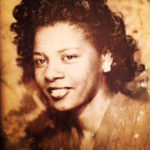I write narratives and short stories.
I am no poet.
But, today a sister in the game needs a chorus.
I, too, met a man in the game and got married.
I took my love for him to the altar with my dreams and goals in tow.
What the Word didn’t teach is what the world would expect:
That young wifey would live life off the grid with a quieted voice nobody would ever know.
For some that may be cool, but for many it’s a challenge like forcing a circle into a space made for a square.
Today the news is all busy talking about the women in the game.
A subject that most in the media have little authority on which to debate.
If the sister ain’t on a soup commercial or cooking and caretaking on some other product ad
You fellas don’t seem to want to hear her speak.
She dare not voice her opinion or
Ask why you do the same old thing just because somebody has always
Done the same old thing or she will get dismissed
As a mouthy, opinionated, interfering woman who doesn’t know her place.
Her place is over there
Or at the house
Or doing something to support the team
In a way that supports and protects the brand, of course.
What does that mean?
Don’t ever call the stupid stupid.
Don’t ever point out the obvious even if it can be supported by stats.
Don’t demand that people respect you like they respect the guys
And by all means, protect the egos
And the brand.
In general it means love your guy, love the game, chose your words with wise measure and Speak only with those with whom you feel safe.
The sisters in the shadows have a role, but not employment.
The sisters in the shadows have expectations from the brand that gives them residual benefits via their man.
We married men we loved who had a love for a game.
Then we learned that we dare not complain about a thang.
Cuz folks will say “She knew what she was getting into!”
Dang, did I really go to law school
To prepare to drive in a carpool.
Now, that would be the plan of fool.
I say, “Yay!” to the sister who finds a way to live out of the shadow of the game.
I say, “Yay!” to the sister who speaks in a voice clear and plain.
I say, “Yay!” to the men who empower sisters with voices and strength and say,
“Be strong, vibrant, independent and great.”
Are you comfortable forcing sisters into the shadows because of tradition and power ?
Have you ever thought about your complicity in quieting the voice of smart, capable sisters?
Are you engaging in the banter and debate without inviting the sisters out of the shadow to speak about their skill sets, their choices, and the sacrifices they make?
There is no one face of the women who live in the shadows of the games.
There are not two faces that represent the women who live in the shadows of the games.
There are many faces.
There are many women.
We are wives.
We are significant others.
We are mothers.
We are caretakers.
We are working moms.
We are furniture packers and movers.
We are community volunteers and activists.
We are business owners.
We are educated and skilled.
We are strong.
We are resilient.
We are proud.
We are women with voices who ought not be shamed for speaking to or about the business that controls the movements of our families, our emotions, our culture and the people we love.
Ode to my sisters in the shadows
Who live and stand strong.
Ode to my sisters in the shadows
Who decide to support the men they love who have love for a game.
Stand strong together my sisters in the shadows until
You find the perfect audience for your voice.
Oh…and when you find it, find a way to live right there.




